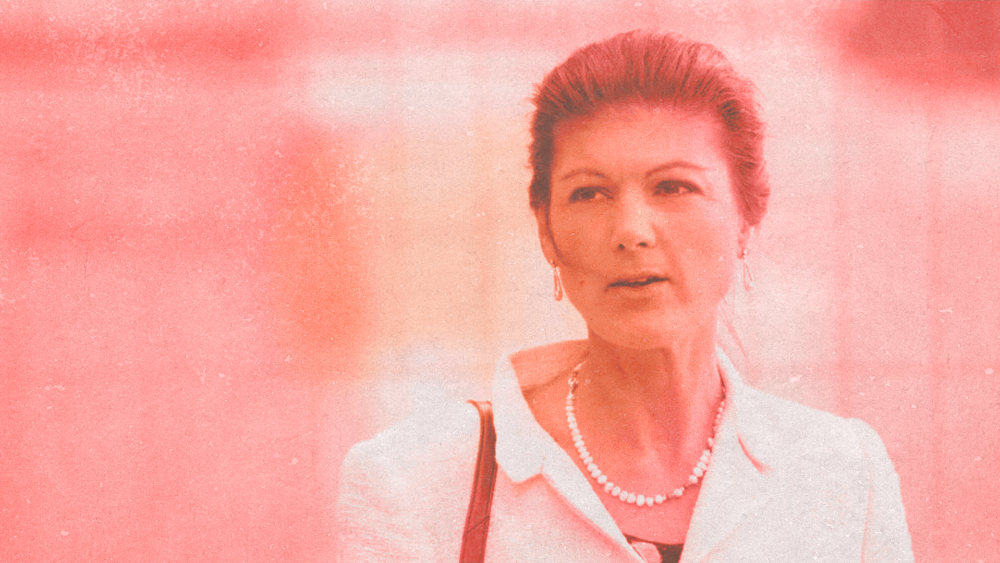Those who want real change in Germany are asking themselves: can her plan really be more of the same?
In the 1990s, Sahra Wagenknecht was a member of the PDS, the successor to the government party in East Germany. The PDS later merged with the West German WASG, as a response to the neoliberal reforms of the SPD-Green coalition under Gerhard Schröder, forming today’s Die Linke. Wagenknecht quickly rose to the top. She was elected with Die Linke to the European and the German parliaments, where she was chairwoman of the parliamentary group from 2015 until 2019.
Her personal mix of conservative, liberal and left positions led to a series of internal conflicts within the party, and especially with its leadership. The conservative German press used her presence in talk shows to fuel these fights, leading to endless cycles of interviews, where Wagenknecht would deviate widely from the party line, which would in turn earn the wrath of her Die Linke comrades. It was a win-win situation for both Wagenknecht and the conservative press: she boosted her public profile and they kept the fights going to divide Die Linke and make it look ridiculous.
Now, in a move that some have been predicting for years, she has officially left Die Linke together with nine other parliamentarians.
The split has been accompanied by an announcement of a new party with her name in the title: BSW – Sahra Wagenknecht Alliance – for Reason and Justice. It is clear that this is less of a party and more of a personality cult. And if you look at what she published so far of their program, it doesn’t get better.
Wagenknecht: Socially conservative, liberal on climate policy and foreign policy serving German industry
Wagenknecht always happily joined the chorus of media and parties who claim that misery in Germany is the fault of “newcomers” instead of those who have been in power for decades. The same applies against what she calls the “scurrilous minorities”, minority groups who dare demand for themselves the same freedoms and rights that all citizens enjoy. She also supports the current policy of the German government, promoting asylum procedures at the EU borders and the Danish model of foreclosure. Unshackled from her former party, this xenophobic rhetoric will only increase, in a cynical ploy to gather votes by stoking social ambers.
When confronted about climate collapse, Wagenknecht makes only a fake allusion to “new, innovative technologies”. In short: she has no plan.
And then there is her foreign policy stance, which has also earned her criticism as a Vladimir Putin apologist in the past. In her press conference, she clearly stated that she views the lives of Ukrainians and Palestinians as a matter to be decided according to the interests of German industry. Her understanding of “reason”, which she proudly brandishes in her party’s name, is nothing short of misanthropy.
Hers is the politics of cynicism – the politics which led Germany and Europe to the sorry state we are in. It is the last thing we need.
What Germany and Europe need instead is a party of the future
The rest of Die Linke is going to have a hard time recovering from its recent electoral defeats. Along with the parliamentarians who left with Wagenknecht, an additional 100 staff members will be lost. The rest of Die Linke is also far from coherent, divided as it is between reformers looking for coalition governments with the Greens and the SPD, and more radical factions wanting to first gather more votes in opposition before participating in government. It seems unlikely that this split will halt their downward trajectory.
Those who want to solve people’s problems must also include newly arrived people. They must re-open the question of ownership, especially in the areas of energy and housing. Germany’s faltering economy must also be reconsidered, otherwise the constantly rising inflation will not be brought under control and the average citizen will continue to pay for the profits of the oligarchs. Socialisation is the answer, but both Wagenknecht and Die Linke seem to lack the political courage to argue for these common sense positions.
The people in Germany and Europe need a party of the future: committed to peace on the side of the weak. Solidarity instead of joining the right’s fear-mongering. A Green New Deal instead of empty phrases against climate change. Lasting social security through the socialisation of the core sectors of our economy. Thankfully DiEM25 around Europe and MERA25 in Germany are here to offer it. The European elections will be the first test.
Do you want to be informed of DiEM25's actions? Sign up here















